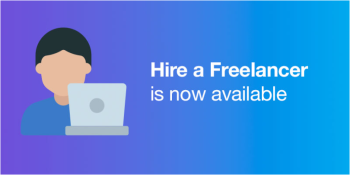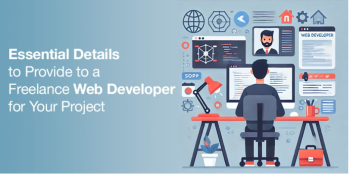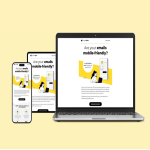You’re probably reading this article because you’ve been applying for work-from-home jobs and you haven’t been hired yet. Seeing all those rejection emails on your email inbox can be very frustrating. Indeed, it can be quite difficult to get a job from freelancing websites like oDesk and Elance, especially when you’re just starting out. However, you don’t have to keep getting rejected.
If you have been unsuccessful in your job applications, there must be a problem somewhere, and you need to address that issue. A Chinese proverb says, “Insanity is doing the same thing and expecting a different result each time.” Stop driving yourself crazy. If you want to stop getting rejected by prospective employers, it’s time for you to make some changes.
Let’s examine the possible reasons why you still can’t get a job and see what you can do to get better results the next time you apply for a job:
1. Your profile is incomplete
A complete profile looks good to employer. It tells them who you are, what you can do, and why they should hire you. It enhances your credibility. On the other hand, an incomplete profile tells them that you are either too lazy to complete it or you have something to hide.
Employers first get to know you through your profile, so make sure that you take the time to complete it. Provide all the information about your background, skills, and location. Also, don’t be a faceless person. You should have a professional-looking photo on your profile.
2. Your profile does not say much about what you can do for your employers
Let’s say your profile practically screams that you’re the best in your field. It lists all your qualifications, skills, strengths, and experience. However, none of these means anything if you can’t tell your prospective employers what you can do for them.
Your profile should include an “elevator pitch.” An elevator pitch is a short and concise statement that tells prospective employers what you can bring to the table. Here’s a good example of an elevator pitch:
“I have two years of experience as a web content writer and have helped clients from the U.S. and the U.K. get more leads and generate more sales through the web content I write. I will provide your company with engaging, search engine optimized web content that will not only help your website rank high in search engines, but also bring hordes of visitors to your website.”
3. You’re not yet a verified user
Becoming a verified user is very easy, but many contractors neglect this step. It can spell a big difference between getting hired and being ignored by employers.A verified status tells employers that the contractor is a “real” person and not someone who is out to defraud employers.
You can be a verified user in no time. All you need to do is to provide a photocopy of a government-issued ID. Elance will require you to talk with a representative who will ask questions about your background. The interview will take only about 15 minutes.
4. You have not taken any tests other those required by the website.
Most freelancing websites require you to take some tests before you can apply for jobs. oDesk, for instance, requires that you pass the English Basic Skills and the oDesk Readiness tests. However, you should not stop at these tests.
Skills tests are designed to measure your knowledge and competence. Most employers see test results as good indicators that a contractor is a good fit for the position that they want to fill. Take all the tests pertinent to your skills. You don’t have to worry about failing any test because you can hide your score and retake the test within a month.
5. You don’t have a portfolio
Your profile tells your prospective employers what you can do for them. However, it’s not enough to tell them what you are qualified or that your skills are at par with their standards. You need to show them. As the saying goes, “The proof of the pudding is in the eating.”
If you’re a writer, prepare at least three writing samples. You can either upload writing samples to the site or provide a link to your blog. If you’re a graphic designer, be sure that you have sample logos and website headers. There are a lot of websites such as Carbonmade and Behance that offer to host images for free. If you’re a social media marketer, be prepared to show links to your social media profiles and pages. Also selling products on marketplaces like Codester can be great for your portfolio.
6. You charge too much
“Low-balling” or the practice of charging the lowest fee so you can get hired is frowned upon and it should be. You’re not doing anybody any favor except probably the one who hired you. You should get paid what you’re truly worth. However, your fees should be reasonable and within the industry benchmark.
Do your research and find out how much freelancers in your field of expertise are paid. If you’re a newbie, you may want to start with a few small projects just so you can get some feedback from employers. You need to prove your worth first. Then, you can raise your hourly rate or charge higher fees for fixed rate projects.
If you feel that you deserve to earn more because of your experience and your competence, then probably you should look elsewhere for jobs. There are tons of work-from-home job opportunities outside freelancing websites, and the pay may be a lot better.
7. You don’t have a feedback score yet
Social proof is crucial if you want to get ahead of your competition and bag high-paying jobs. There are a lot of employers who base their hiring decisions simply on what others have said about certain contractors. There are two things you can do to earn high feedback scores: a) Do your job well; and b) Be responsive and easy to get in touch with.
What if you are a newbie and have yet to earn your first feedback score? Again, start with a few small easy projects. The pay may be low, but think of these projects as opportunities to prove your worth. Once you have gathered at least two high feedback scores, you can move on to bigger, better-paying projects.
8. You don’t apply for a lot of jobs.
Some contractors get too scared or too intimidated to apply for jobs. They are terrified of rejections and when they do get rejected, they get discouraged.However, common sense will tell you that if you don’t apply for jobs, you won’t get hired.It’s that simple.
Accept rejection as a fact of life. Don’t take it personally. Even the best contractors can get rejected. Sometimes, you can get rejected, not because someone else is better than you, but because that contractor is willing to do the job for a much lower rate.
Go ahead and apply for jobs that match your skills and qualifications. Don’t let fear stop you. The more jobs you apply for, the better your chances are of getting hired. Put the law of averages to work for you.
9. You don’t study your competition
One of the realities you have to accept as a contractor is that you are up against hundreds, if not thousands, of other contractors. However, this doesn’t mean that you can’t win. You can, if you know how to blow your competition out of the water.
Of course, you’re not out to destroy anybody’s reputation, but you can study your competitors so you can outdo them. Check out the profiles of contractors who have scored tons of projects. What do they have to offer that you don’t? What can you offer that they don’t? How do they market themselves? Also, look at their portfolios and try to do better.
10. You mess up your interviews
One of the most exciting moments you can have when you apply for a job is receiving an email with the heading “Invitation to Interview.” That means that you got the attention of your prospective employer and you’re only one step to getting hired. However, you’re not quite there yet.
There are two possible reasons you can fail an interview. One is if you let your nerves get the best of you. Employers want contractors who are confident of themselves and what they have to offer. Perhaps the best thing you can do is to change your mind set about the employer-contractor relationship.
Your prospective employer is not your superior. You are equals. The employer needs you as much as you need him or her. An interview is not an interrogation session. Rather, it’s the process of finding out if you can establish a mutually-beneficial relationship with the employer.
The other reason you can fail an interview is if you get caught in a lie. A liar needs a good memory, so it’s always safer to tell the truth. Besides, nobody wants to hire a dishonest person, so make sure that you answer every question truthfully.
If an employer asks if you have a certain skill that you don’t actually possess, be honest about it. You may not be a good fit for that particular job, but that doesn’t mean you’re incompetent. It’s always better to have a job that allows you to use your best talents. You will be happy in the long run.
What is next?
Hopefully you can make something useful out of tips given in this article. At the same time you can always try to make income selling your designs, apps and plugins as ready-to-use templates and components on the Codester marketplace 😉 .
What is your experience on Freelancer marketplaces?







